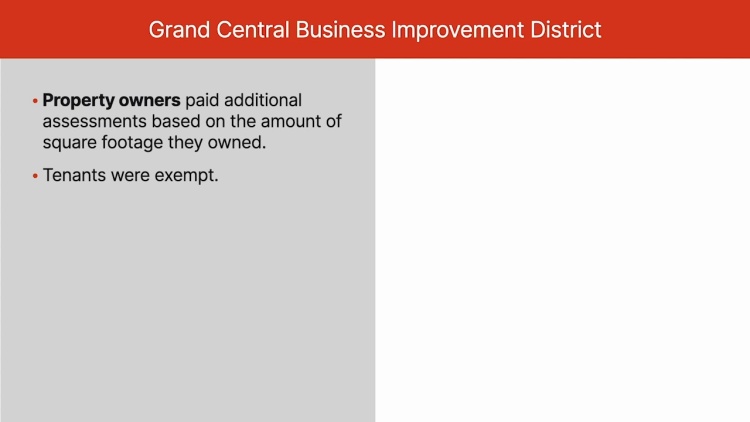Kessler v. Grand Central District Management Association, Inc.
United States Court of Appeals for the Second Circuit
158 F.3d 92 (1998)
- Written by Anjali Bhat, JD
Facts
The New York state legislature authorized municipalities to establish business-improvement districts (BIDs), in which the owners of nonexempt real property paid an assessment in addition to municipal taxes. The assessments were used to fund (1) capital improvements to land and (2) services that were intended to promote business activity. These services had to be in addition to and not in lieu of those provided by the municipality. After the establishment of a BID, the municipality retained its authority over the district, including the authority to make improvements to owned or leased BID property. Each BID had a district-management association that made recommendations to the municipal council regarding BID-related matters. Each BID’s management association was required to have a board of directors, the majority of whom had to represent property owners, not tenants, within the district. Robert Kessler and Vicki Cheikes (plaintiffs), residents of the Grand Central BID in midtown Manhattan, sued Grand Central District Management Association, Inc. (GCDMA) (defendant), arguing that GCDMA’s management of the Grand Central BID involved sufficient governmental power to require that GCDMA’s board elections comply with the one-person one-vote requirement. The United States District Court for the Southern District of New York granted summary judgment for GCDMA on the ground that the Grand Central BID was a special limited-purpose entity disproportionately affecting one class of constituents and therefore was not subject to the one-person one-vote requirement. The plaintiffs appealed.
Rule of Law
Issue
Holding and Reasoning (Kearse, J.)
Dissent (Weinstein, J.)
What to do next…
Here's why 907,000 law students have relied on our case briefs:
- Written by law professors and practitioners, not other law students. 47,100 briefs, keyed to 996 casebooks. Top-notch customer support.
- The right amount of information, includes the facts, issues, rule of law, holding and reasoning, and any concurrences and dissents.
- Access in your classes, works on your mobile and tablet. Massive library of related video lessons and high quality multiple-choice questions.
- Easy to use, uniform format for every case brief. Written in plain English, not in legalese. Our briefs summarize and simplify; they don’t just repeat the court’s language.





